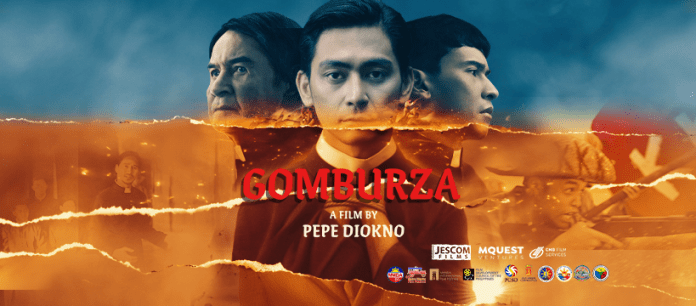Is the Philippines just a country cursed with bad luck?
This is one of the main questions asked by one of the titular characters of “GomBurZa”, one of the 2023 Metro Manila Film Festival (MMFF) entries. Directed by Pepe Diokno, it presents a two-plus-hour story of the events leading up to the execution of the three martyrs that laid the foundation for the eventual end of the Spanish colonization of the Philippines.
Committed to a fault
“GomBurZa” continues the recent resurgence of the historical genre in mainstream Philippine cinema. This is in no small part to how the social and political conditions back then remain largely similar to today’s environment. This resonates with today’s audiences well, and filmmakers wisely emphasize these messages while remaining faithful to what is depicted within historical records.
No, the movie doesn’t quite live up to the hype of being the biggest historical movie of the decade, let alone the heights that “Heneral Luna” or the 1998 MMFF entry “Jose Rizal” did. It felt like reading through a historical textbook, which was ironically similar to how the law students in the movie felt during their class taught in Latin.
The chapters-based style of storytelling may have been what was desired, which in a way is amplified by the film’s commitment to being as historically accurate as possible. The costumes, the environments used, and the cinematography all combine to provide the viewer with an authentic feel of the Spanish-era Philippines.
Yet this sternness also failed to present a strong emotional weight for much of its runtime. Many actors got neither enough focus nor depth in the given material to portray their characters, most notably Enchong Dee’s Fr. Jacinto Zamora. While the priest’s decline into complete disorientation was accurate, the lack of focus on his internal pain led to a lack of emotional punch during his execution.
Nonetheless, in a cast full of recognizable names and talented actors, Cedrick Juan (who played Fr. Jose Burgos) easily gave the standout performance of the film, aided by his character’s central role in this part of history. Piolo Pascual’s as Fr. Pedro Pelaez is also a welcomed act for setting the tone for the rest of the narrative.
In contrast to the typical larger-than-life portrayal of historical figures in recent years, “GomBurZa” takes a relatively grounded approach to heroism. Outside of their collective and respective advocacies, it depicted Burgos as a mentor to the next generation, Zamora as a gambler after his duties, and Fr. Mariano Gomes as a teacher of agriculture to his constituencies.
This also extends to how scenes that would usually be showcased in a glorified, even romanticized manner were shown to be sudden and/or mundane, from Pelaez’s demise to the fate of a rebel that led to the ill-fated Cavite mutiny. Yet it must be noted that this style adds to the aforementioned lack of emotional resonance.
Not just bad luck
The film highlights how faith can inspire wider sociopolitical paradigm shifts. Large parts of the Filipino culture and society have been shaped by Catholicism for centuries, from daily prayers to annual fiestas, from education to architecture. Yet it also reminds us how the Church has provided a powerful presence during key periods of our history, from its influence on the Filipino elite during the 1930s to the 1986 People Power Revolution.
Even today, many men and women of the cloth are at the frontlines fighting for social justice and protection of human rights in the country. For instance, bishops, nuns, and priests have been among the driving forces for campaigns to address environmental issues affecting their communities, such as mining, fossil fuels, deforestation, and divestment. Similar to what transpired more than 150 years ago, they also face numerous threats due to their advocacies, ranging from red-tagging to acts of violence.
Nevertheless, the same social, cultural, and political issues keep appearing across generations of Filipinos. To answer Burgos’s question, it is not a matter of bad luck or a curse, whether you believe in either, both, or not.
Just like back then, it is a systemic dilemma where many of those with power and wealth [or in favor of them] get away with abuses without being held accountable. It must be emphasized that these days, a large section of the public, who should have caught on already and learned from the mistakes of the past, is not helping end these destructive cycles by instead enabling and glorifying these people who commit such acts.
We all have met people who purely leave it to their faith to deal with problems, personal or societal. There remains this notion among some Filipinos that religion, especially Catholicism, being strictly conservative is holding back the attainment of what we perceive as progress.
Yet this film and what we have seen from some contemporary Church leaders show that faith alone will not move metaphorical mountains; the clergy has to embody the calls for change in actions as much as in sermons on Sundays. This also applies to every community and every generation in the nation, especially if we still care about redefining what it means to be Filipinos.
If “GomBurZa” aims to educate viewers on the story of the men to whom Jose Rizal dedicated “El Filibusterismo”, it succeeded in this regard. If it intends to evoke a strong sense of nationalism and inspire Filipinos through the sheer power of its storytelling, it came up short.
John Leo is the National Coordinator of Aksyon Klima Pilipinas and the Deputy Executive Director for Programs and Campaigns of Living Laudato Si’ Philippines. He has been an avid viewer of the Metro Manila Film Festival for 13 years. He earned his MS Atmospheric Science degree from the Ateneo de Manila University.









